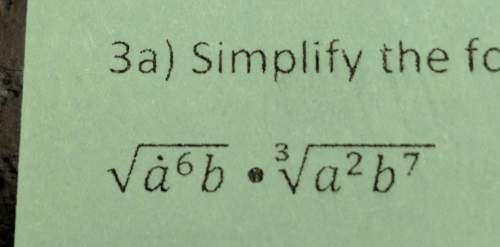
Mathematics, 28.11.2019 22:31 sanafarghal
Find a formula for the nth partial sum of the series and use it to determine if the series converges or diverges. if a series converges, find its sum. summation from n equals 1 to infinity ( √(n+1) - √(n))

Answers: 2


Another question on Mathematics

Mathematics, 21.06.2019 20:00
Choose the linear inequality that describes the graph. the gray area represents the shaded region. a: y ≤ –4x – 2 b: y > –4x – 2 c: y ≥ –4x – 2 d: y < 4x – 2
Answers: 2

Mathematics, 21.06.2019 21:30
Two rectangular prisms have the same volume. the area of the base of the blue prism is 418 4 1 8 square units. the area of the base of the red prism is one-half that of the blue prism. which statement is true?
Answers: 3

Mathematics, 21.06.2019 23:00
What is the value of x in the equation7x+2y=48 when y=3
Answers: 2

Mathematics, 22.06.2019 00:50
Assume that adults have iq scores that are normally distributed with a mean of mu equals 100 and a standard deviation sigma equals 20. find the probability that a randomly selected adult has an iq between 80 and 120.assume that adults have iq scores that are normally distributed with a mean of mu equals 100 and a standard deviation sigma equals 20. find the probability that a randomly selected adult has an iq between 80 and 120.
Answers: 3
You know the right answer?
Find a formula for the nth partial sum of the series and use it to determine if the series converges...
Questions

Mathematics, 04.12.2021 20:40


Mathematics, 04.12.2021 20:50


Mathematics, 04.12.2021 20:50

Social Studies, 04.12.2021 20:50






Health, 04.12.2021 20:50

Mathematics, 04.12.2021 20:50

English, 04.12.2021 20:50



Computers and Technology, 04.12.2021 20:50

Mathematics, 04.12.2021 20:50

Mathematics, 04.12.2021 20:50





